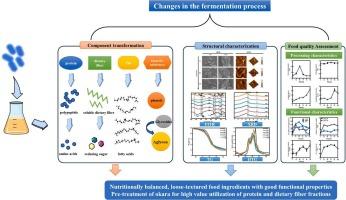枯草芽孢杆菌BSNK-5对大豆的转化作用及其组分转化、结构特征和功能特性研究
IF 9.8
1区 农林科学
Q1 CHEMISTRY, APPLIED
引用次数: 0
摘要
黄秋葵的高价值利用对于促进大豆产业的可持续发展和应对全球粮食安全挑战至关重要。本研究调查了枯草芽孢杆菌 BSNK-5 发酵对秋葵营养、结构和功能特性的影响。BSNK-5 发酵能有效地将不溶性膳食纤维、蛋白质和脂肪降解为可溶性纤维、肽、氨基酸和脂肪酸,同时减少胰蛋白酶抑制物和抗原蛋白。发酵还能增加酚类化合物,促进苷类向苷元的转化,提高消化率和营养质量。发酵会引起结构变化,如表面破坏和质地软化。此外,BSNK-5 发酵还提高了持水性、持油性、膨胀能力、抗氧化活性、胆固醇结合力、葡萄糖吸收和抗高血压特性。这些结果凸显了 BSNK-5 发酵在提高秋葵营养和功能价值方面的潜力,为食品工业提供了宝贵的原材料。本文章由计算机程序翻译,如有差异,请以英文原文为准。


Transformation effects of Bacillus subtilis BSNK-5 on okara: Insights into its component transformation, structural characteristics, and functional properties
The high-value utilization of okara is vital for promoting sustainable practices in the soybean industry and addressing global food security challenges. This study investigated the effects of Bacillus subtilis BSNK-5 fermentation on okara's nutritional, structural, and functional properties. BSNK-5 fermentation effectively degraded insoluble dietary fiber, protein, and fat into soluble fiber, peptides, amino acids, and fatty acids, while reducing trypsin inhibitors and antigenic proteins. It also increased phenolic compounds, promoted the conversion of glycosides to aglycones, and enhanced digestibility and nutritional quality. After fermentation with BSNK-5, the surface wrinkles of the okara were reduced, and the particles became smaller. Additionally, BSNK-5 fermentation improved water-holding, oil-holding, swelling capacities, antioxidant activity, cholesterol binding, glucose absorption, and antihypertensive properties. These results highlight the potential of BSNK-5 fermentation to enhance okara's nutritional and functional value, providing valuable raw materials for the food industry.
求助全文
通过发布文献求助,成功后即可免费获取论文全文。
去求助
来源期刊

Food Chemistry
工程技术-食品科技
CiteScore
16.30
自引率
10.20%
发文量
3130
审稿时长
122 days
期刊介绍:
Food Chemistry publishes original research papers dealing with the advancement of the chemistry and biochemistry of foods or the analytical methods/ approach used. All papers should focus on the novelty of the research carried out.
 求助内容:
求助内容: 应助结果提醒方式:
应助结果提醒方式:


